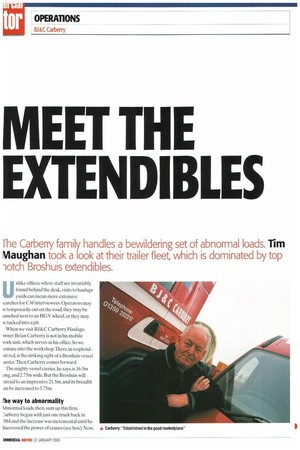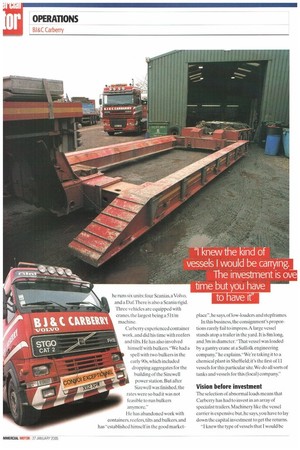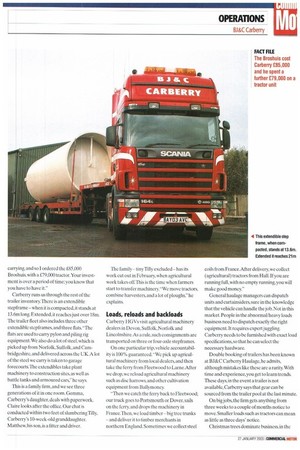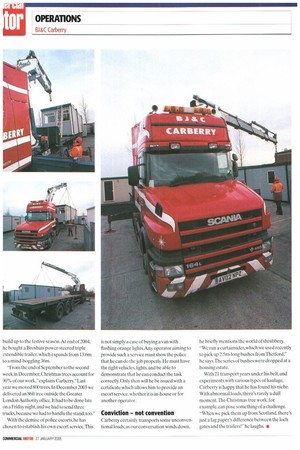MEET THE EXTENDIBLES
Page 60

Page 62

Page 63

Page 64

If you've noticed an error in this article please click here to report it so we can fix it.
The Carberry family handles a bewildering set of abnormal loads. Tim
Vlaughan took a look at their trailer fleet, which is dominated by top
notch Broshuis extendibles.
Unlike offices, where staff are invariably found behind the desk, visits to haulage yards can mean more extensive earches for CM interviewees. Operators may )e temporarily out on the road, they may be lunched next to an HGV wheel, or they may )e tucked into a pit.
When we visit 131&C Carberry Haulage, miner Brian Carberry is not in his mobile vork unit, which serves as his office. So we ,enture into the workshop.There, in resplendmt red, is the striking sight of a Broshuis vessel .arrier.Then Carberry comes forward. The mighty vessel carrier, he says, is 16.5m ong, and 2.75m wide. But the Broshuis will :xtend to an impressive 21.5m, and its breadth an be increased to 3.75m.
rhe way to abnormality
\ bnormal loads, then. sum up this firm. :arberry began with just one truck back in 984 and the increase was incremental until he liscovered the power of cranes (see box). No • Carberry: ''Established in the good marketplace" he runs six units: four Scanias, a Volvo, and a DafThere is also a Scania rigid. Three vehicles are equipped with cranes, the largest being a 51t/m machine.
Carberry experienced container work, and did his time with reefers and tilts. He has also involved himself with bulkers."We had a spell with two bulkers in the early 90s, which included dropping aggregates for the building of the Sizewell power station. But after Sizewell was finished, the t utes were so bad it was not feasible to run bulkers anymore."
He has abandoned work with containers, reefers, tilts and bulkers, and has"established himself in the good market place", he says, of low-loaders and stepframes.
In this business, the consignment's proportions rarely fail to impress. A large vessel stands atop a trailer in the yard. It is 8m long, and 3m in diameter. 'That vessel was loaded by a gantry crane at a Suffolk engineering company,he explains. "We're taking it to a chemical plant in Sheffield; it's the first of 11 vessels for this particular site. We do all sorts of tanks and vessels for this (local) company."
Vision before investment
The selection of abnormal loads means that Carberry has had to invest in an array of specialist trailers. Machinery like the vessel carrier is expensive but,he says, you have to lay down the capital investment to get the returns.
"I knew the type of vessels that I would be carrying, and so I ordered the 185,000 Broshuis, with a .£79,000 tractor. Your investment is over a period of time: you know that you have to have it."
Carberry runs us through the rest of the trailer inventory.There is an extendible stepframe when it is compacted, it stands at 13.6m long. Extended,it reaches just over 18m. The trailer fleet also includes three other extendible stepframes, and three flats. "The flats are used to carry pylon and piling rig equipment.We also do a lot of steel, which is picked up from Norfolk,Suffolk, and Cambridgeshire, and delivered across the UK.A lot of the steel we carry is taken to garage forecourts.The extendibles take plant machinery to construction sites, as well as battle tanks and armoured cars," he says.
This is a family firm, and we see three generations of it in one room. Gemma, Carberry's daughter, deals with paperwork. Claire looks after the office. Our chat is conducted within two feet of slumbering Tilly. Carberry's 10-week-old granddaughter. Matthew his son, is a fitter and driver. The family tiny Tilly excluded has its work cut out in February, when agricultural work takes off.This is the time when farmers start to transfer machinery."We move tractors, combine harvesters, and a lot of ploughs.he explains.
Loads, reloads and backloads Carberry HG Vs visit agricultural machinery dealers in Devon, Suffolk, Norfolk and Lincolnshire. As a rule, such consignments are transported on three or four-axle stepframes.
On one particular trip, vehicle accountability is 100% guaranteed."We pick up agricultural machinery from local dealers, and then take the ferry from Fleetwood to Larne.After we drop, we reload agricultural machinery such as disc harrows, and other cultivation equipment from Ballymoney.
"Then we catch the ferry back to Fleetwood; our truck goes to Portsmouth or Dover, sails on the ferry, and drops the machinery in France.Then, we load timber-big tree trunks -and deliver it to timber merchants in northern England. Sometimes we collect steel coils from France. After delivery, we collect (agricultural) tractors from Hull. If you are running full, with no empty running, you will make good money."
General haulage managers can dispatch units and curtainsiders, sure in the knowledge that the vehicle can handle the job. Not in this market. People in the abnormal/heavy loads business need to dispatch exactly the right equipment. It requires expert juggling. Carberry needs to be furnished with exact load specifications, so that he can select the necessary hardware.
Double booking of trailers has been known at BJ&C Carberry Haulage, he admits, although mistakes like these are a rarity. With time and experience, you get to learn trends. These days, in the event a trailer is not available, Carberry says that gear can be sourced from the trailer pool at the last minute.
On big jobs, the firm gets anything from three weeks to a couple of months notice to move. Smaller loads such as tractors can mean as little as three days' notice.
Christmas trees dominate business, in the build up to the festive season.At end of 2004, he bought a Broshuis power-steered triple extendible trailer, which expands from 13.6m Lo a mind-boggling 36m.
"From the end of September to the second week in December, Christmas trees account for 90% of our work," explains Carberry. "Last year we moved 800 trees. In December 2003 we delivered an 86ft tree outside the Greater London Authority office. It had to be done late on a Friday night, and we had to send three trucks, because we had to handle the stand, too."
With the demise of police escorts, he has chosen to establish his own escort service. This is not simply a case of buying a van with flashing orange lights. Any operator aiming to provide such a service must show the police that he can do the job properly. He must have the right vehicles, lights, and be able to demonstrate that he can conduct the task correctly. Only then will he be issued with a certificate which allows him to provide an escort service, whether it is in-house or for another operator.
Conviction not convention
Carberry certainly transports some unconventional loads; as our conversation winds down, he briefly mentions the world of shrubbery. "We run a curtainsider, which we used recently to pick up 2.5m-long bushes from Thetford," he says.The series of bushes were dropped at a housing estate.
With 21 transport years under his belt, and experiments with various types of haulage, Carberry is happy that he has found his niche. With abnormal loads, there's rarely a dull moment.The Christmas tree work, for example, can pose something of a challenge. "When we pick them up from Scotland, there's just a fag paper's difference between the loch gates and the trailers!" he laughs. •


































































































































































































